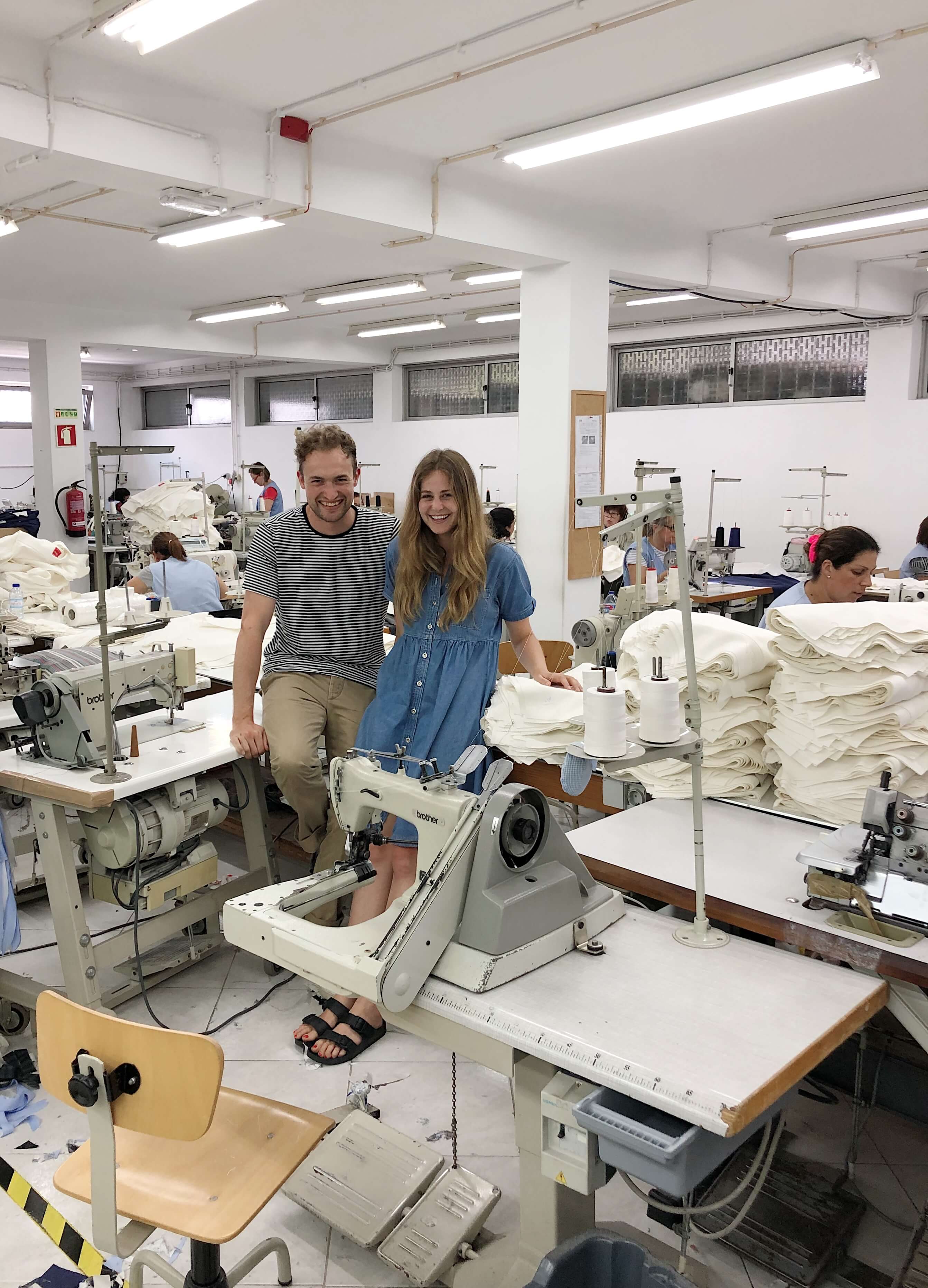Small businesses are small for a reason – they often have a limited budget and resources, and usually consist of fewer team members. Yet, this can be their greatest asset. When things are done at a smaller scale, without the pressure to pursue growth, entrepreneurs are less constrained and can fully embrace their vision and goals. This leads to building a business that they can feel good about.
Companies don’t have to grow at an exponential rate in order to make a great impact. In season 2, episode 3 of our podcast Small Business Big Lesson, we cover how for some businesses, staying small can be a superpower. In this companion blog post, we’ll share their stories and showcase why, sometimes, thinking small can lead to the biggest dividends.
What are the benefits of staying small?
There can be a misperception that small businesses need to expand their operations in order to be successful. Not only can small businesses stay small and still be profitable, but there are a myriad of other benefits that they can reap.
Stronger team relationships
According to business coach Holly Howard, one of the biggest advantages of staying small is that it allows for a healthier company culture where individuals can form stronger ties with one another.
As mentioned in season 2, episode 2 of Small Business, Big Lessons, employees can sometimes get the short side of the stick when a company focuses on growth at the expense of their team members. This can lead to team members feeling overworked, undervalued, and less connected to the company, decreasing employee engagement – the emotional commitment an employee has to the company. But when team sizes are smaller, there’s more opportunity to develop a healthier, more connected company culture.
“It has to do with intimacy,” Holly said. “When you intentionally stay small, you can have really meaningful connections with everybody on the team or in the company.”
Creating a healthy company culture is not only good for employees’ overall satisfaction, but it can lead to a better bottom line for the business. Studies have found that when teams have higher levels of engagement, productivity increases by 17 percent, and sales increase by 20 percent.
More autonomy
Another plus of running a small business is that entrepreneurs have more autonomy and control in their day-to-day work. This is because small business owners are their own bosses and can do whatever they feel is best for their company. Since team sizes are typically smaller and there are fewer levels of management to go through, small businesses allow for more adaptability – a huge pro for entrepreneurs.
According to Forbes, a 2018 study found that this very freedom allowed self-employed individuals to be more engaged and find their jobs more rewarding than their peers who worked traditional jobs. Holly believes this flexibility is one of the reasons some entrepreneurs choose to intentionally stay small.
“The other part might be this creative adaptability that you really have when you are smaller, versus when you've scaled to a certain size,” said Holly. “And that creative adaptability is something that a lot of entrepreneurs are very passionate about, that really inspires them.”
More equity
More small businesses can lead to a more equitable society, according to Sparktoro co-founder Rand Fishkin. He believes that it’s healthier for society and democracy when there are more thriving small businesses and fewer monopolies. This is a driving principle for how he operates Sparktoro, and why he has no plans to expand the company in the near future.
“A big part of our passion around [small businesses] comes from our broader beliefs about sustainability and economic justice,” Rand said. “We believe that economies work really well, democracy works really well, capitalism works really well when there are lots of small and medium businesses, lots of competition in a sector, and that competition is fair and equitable.”

And Rand’s not wrong. According to the Robert Wood Johnson Foundation, “small businesses create jobs, build wealth and help close racial and gender wealth gaps, especially in communities where opportunities have been limited historically.”
Championing small businesses means supporting diverse and oftentimes underrepresented communities and also stimulating the economy.
How staying small has allowed these businesses to operate differently
Rather than sticking to the status quo, these entrepreneurs are able to run their businesses differently, and in ways that are more sustainable and impactful, all because of their agile size.
Harlow pursues growth on their own terms
Andrea and Samantha left their marketing jobs because they wanted more autonomy in their work lives, something they now have at Harlow – a small business they created together that helps freelancers get organized.
At Harlow, they’ve been able to establish ground rules that allow their team to work at their own pace, including no meeting days, flexible working hours, and prioritizing self-care. These are initiatives they were able to put in place because they’re a smaller team, and they believe these policies will benefit them in the long run.
“We want to build a profitable and sustainable business, and one that doesn't burn us out, you know? We are in this for the next 5, 10 years,” Andrea said.
Staying small has allowed the co-founders to pursue growth on their own terms. While they do hope they attract more clients to Harlow, they’re not willing to compromise their values in doing so.
“I think the thing that gets lost sometimes when we talk about staying small is it's not that we want the company to stay small. We want more and more users to join Harlow and experience the power of Harlow and the simplicity of Harlow. …. But again, we want to do so in a way that feels good for us.”
Paynter Jacket cultivates personal connections with their suppliers
A huge plus for Becky and Huw of Paynter Jacket – an ethical clothing company that releases four limited edition jackets each year – is that they’re able to develop a close relationship with their suppliers. This is often not the case for larger clothing companies that place bulk orders and never meet the factory workers who produce their garments.
This relationship between Becky, Huw, and their supplies didn’t happen overnight. But as Paynter Jacket placed more and more small orders, a trusting relationship soon developed.
“After long enough of doing that, when the proof is there, and they do trust you – that's when [the relationship] then turns into something really special. And actually, our factories have told us they are small businesses too.”
Becky also believes by ordering a limited number of jackets each year, and by forging friendships with the factory workers, they help ensure their products are made with the highest quality.
“And we were really lucky to work with some incredible suppliers,” she said. “So we would rather keep working with them and keep creating orders that are the right size for them to manufacture at a really, really high standard and grow together.”
SparkToro forms a different relationship with their customers
As a company not focused on hypergrowth, Sparktoro isn’t interested in retaining as many customers as possible like other Saas companies. In fact, Rand knows that most tech companies purposely make it hard for customers to cancel a membership or subscription and he’s very intentional in doing things differently.
“There's a lot of what I call ‘UX dark patterns' and sort of marketing tips and tricks that you can use to make sure people don't leave the subscription,” Rand said. “You make the cancel button harder to find, or you have to call to cancel … And we don't do any of that stuff.”
Instead, Sparktoro sends monthly reminders to customers to cancel their subscriptions before they get billed. This means that the small business does have a high cancellation rate, but, they also have a very high recidivism rate, meaning people will renew their membership.
“People come back to the product again, and again,” Rand said. “We've had folks who signed up for Spark Toro and quit five, six times, and we've only been around two years. We wouldn't be able to do those kinds of things if we were pursuing growth at all costs.”
Other personal benefits these entrepreneurs have gained from staying small
Operating small and lean businesses has provided these entrepreneurs with many advantages in their personal lives as well.
Rand observes a chill workweek
Sparktoro’s three team members observe what they call a “chill work week." Rather than spending over 40 hours a week working, as many tech companies do, Rand and his colleagues typically put in 25 to 30 hours a week.
Of course, there are some weeks when the team may have to work more hours, but for the most part, they’ve been able to run a successful business and maintain a great work-life balance all at once. Rand credits this to the company’s philosophy around keeping things small, not chasing growth, and focusing on the most essential work.
“I spent almost a month in Italy in the spring,” Rand said. “And I was barely putting in two hours a day. It was beautiful – running a company that's got a million-plus dollar ARR run rate and growing nicely. And still managing to work very few hours essentially.”
Samantha and Andrea conduct one-on-one meetings with freelancers
Samantha and Andrea conduct free, 15-minute one-on-one sessions with various freelancers to offer advice and support. It’s a way for them to give back to the community but also grow their personal networks as well.
If they were a larger company, it would be difficult to scale this size of a program, but because they’re smaller and have more flexibility in their days, it’s something they can easily fit into their schedules. Their nimble size allows them to quickly pursue these kinds of opportunities, rather than having to go through a longer approval process.
“It would be a lot harder to launch a program like that at a larger organization … and so it is wonderful that we can just test something out like that. I can, on a spur of the moment, just tweet about something, and then we can build a program around it,” Samantha said.
Becky and Huw get to be a part of every step of the process
A huge perk of running a small company for Becky and Huw is that they’re able to work on every aspect of the business – including product design, customer service, annual planning, and setting up photo shoots – themselves.
“We're both really detail-oriented,” Becky said. “And we just get really excited that we have a whole variety of things that make up our day. And we're completely in charge of our own learning.”

As they only have one other part-time employee, being a small team has also allowed for more originality in their work. Becky says that this shows through in everything they do, including the way their product shots turn out.
“It might mean that if there's a storm, and your location is the beach, then your umbrellas are upside down and things look a bit chaotic,” she said. “And you're probably going to stop and look at that picture a lot more than you would with something that looks kind of perfect.”
This is important to the duo, as they always want their customers to see that even though they’ve created a successful fashion brand, Paynter Jacket consists of real people.
It’s not that there aren’t any challenges to staying small, but ultimately, these business owners wouldn’t have it any other way. For Huw in particular, running Paynter Jacket with Becky has been immensely rewarding and he hopes to keep doing it for years to come.
“There's a great quote in this book called ‘Rework,’ and it's, ‘small isn't a stepping stone, small is a great destination in itself,’” he said. “We truly believe there's beauty in small business. Just the statistics of it. Small businesses are the biggest employers in the country.”
Want more on intentionally staying small? Check out the full episode
The businesses we interviewed in this episode have further insights to share about intentionally staying small and its value for brands. Check out the full episode here.
Try Buffer for free
190,000+ creators, small businesses, and marketers use Buffer to grow their audiences every month.




